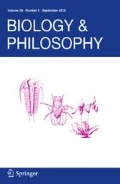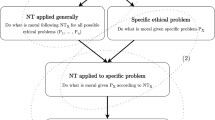Abstract
Conventional wisdom has it that evolution makes a sham of morality, even if morality is an adaptation. I disagree. I argue that our best current adaptationist theory of meaning offers objective truth conditionsfor signaling systems of all sorts. The objectivity is, however, relative to species – specifically to the adaptive history of the signaling system in question. While evolution may not provide the kind of species independent objective standards that (e.g.) Kantians desire, this should be enough for the practical work of justifying our confidence in the objectivity of moral standards. If you believe morality is an adaptation, you should be a moral realist.
Similar content being viewed by others
References
Alexlrod, R.: 1984, The Evolution of Cooperation, Basic Books, New York.
Barkow, J., Tooby, J. and Cosmides, L.: 1992, The Adapted Mind: Evolutionary Psychology and the Generation of Culture, Oxford University Press, New York.
Batali, J. and Kitcher, P.: 1995, ‘Evolution of Altruism in Optional and Compulsory Games’, Journal of Theoretical Biology 175, 161–171.
Cheney, D.L. and Seyfarath, R.M.: 1990, How Monkeys See the World, University of Chicago Press, Chicago.
Davies, P.S.: 1994, ‘Troubles for Proper Functions’, Nous 28(3), 363–381.
Dawkins, R.: 1989 [1976], The Selfish Gene, New Edition, Oxford University Press, Oxford.
Dawkins, R.: 1995, ‘The Evolved Imagination: Are Our Brains Hard-Wired for Virtual Reality?’, Natural History 104(9), 8.
Dretske, F.: 1986, ‘Misinformation’, in R. Bogdam (ed.), Belief: Form, Content and Function, Clarendon Press, Oxford.
Dretske, F.: 1995, Naturalizing the Mind. MIT Press, Cambridge, MA.
Godfrey-Smith, P.: 1994, ‘A Modern History Theory of Functions’, Nous 28(3), 344–362.
Godfrey-Smith, P.: 1996, Complexity and the Function of Mind in Nature, Cambridge University Press.
Harms, W.F.: 1997, ‘Reliability and Novelty: Information Gain in Multi-Level Section Systems’, Erkenntnis 46, 335–363.
Kitcher, P.: 1993, ‘Four Ways of “Biologicizing' Ethics”’, in K. Bayertz Reclam (ed.), Evolution und Ethik.
Millikan, R.G.: 1984, Language, Thought, and Other Biological Categories: New Foundations for Realism, A Bradford Book, MIT Press, Cambridge, MA.
Millikan, R.G.: 1993, White Queen Psychology and Other Essays for Alice, A Bradford Book, MIT Press, Cambridge, MA.
Neander, K.: 1991, ‘The Teleological Notion of Function’, Australasian Journal of Philosophy 69(4), 454–468.
Putnam, H.: 1983, ‘Why Reason Can't Be Naturalized’, Realism and Reason, Philosophical Papers [3], Cambridge University Press, pp. 229–247.
Ruse, M. and Wilson, E.O.: 1986, ‘Moral Philosophy as Applied Science’, Philosophy 61, 173–192.
Singer, P.: 1975, Animal Liberation: A New Ethics of Our Treatment of Animals, Random House, New York.
Skyrms, B.: 1996, Evolution of the Social Contract, Cambridge University Press.
Sober, E.: 1993, Philosophy of Biology, Westview Press.
Sperber, D.: 1996, Explaining Culture: A Naturalistic Approach, Blackwell, Cambridge, MA.
Tarski, A.: 1994, ‘The Semantic Conception of Truth and the Foundations of Semantics’, Journal of Philosophy and Phenomenological Research 4, 341–375.
Trivers, R.L.: 1971, ‘The Evolution of Reciprocal Altruism’, The Quarterly Review of Biology 46(3), 35–57.
Williams, G.C.: 1994, ‘A Sociobiological Expansion of Evolution and Ethics’, in J. Paradis and G.C.Williams (eds), Evolution and Ethics, Princeton University Press, Princeton, NJ, pp. 179–214.
Wilson, D.S. and Sober, E.: 1994, ‘Reintroducing Group Selection to the Human Behavioral Sciences’, Behavioral and Brain Sciences 17, 585–654.
Wright, L.: 1973, ‘Functions’, The Philosophical Review 82, 139–168.
Wright, R.: 1994, The Moral Animal: The New Science of Evolutionary Psychology, Pantheon Books, New York.
Author information
Authors and Affiliations
Rights and permissions
About this article
Cite this article
Harms, W.F. Adaptation and Moral Realism. Biology & Philosophy 15, 699–712 (2000). https://doi.org/10.1023/A:1006661726993
Issue Date:
DOI: https://doi.org/10.1023/A:1006661726993



